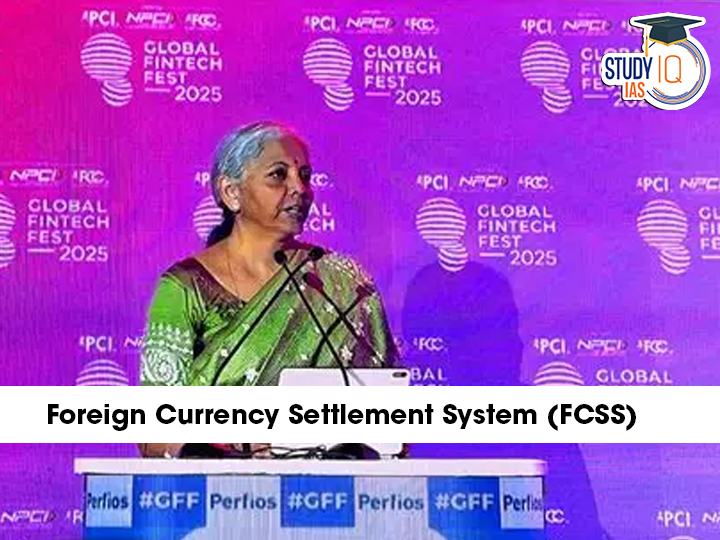Table of Contents
Union Finance Minister Nirmala Sitharaman has launched the Foreign Currency Settlement System (FCSS) at the International Financial Services Centre (IFSC) in GIFT City, Gujarat.
This marks a major milestone in India’s financial sector, as the FCSS allows domestic settlement of foreign currency transactions — a significant step toward global financial integration and reduced dependence on foreign banks.
What is the Foreign Currency Settlement System (FCSS)?
The Foreign Currency Settlement System (FCSS) is a domestic mechanism that enables clearing and settlement of international transactions (in foreign currencies) within India, without routing them through overseas banking systems.
In simpler terms, it allows Indian banks operating in GIFT City (IFSC) to settle trades in major global currencies — such as:
-
US Dollar (USD)
-
Euro (EUR)
-
Japanese Yen (JPY)
— directly in India, rather than depending on foreign correspondent banks.
How FCSS Works
-
FCSS facilitates Payment-versus-Payment (PvP) settlement — meaning one currency is paid only when the other is received.
-
This ensures security, transparency, and minimal counterparty risk.
-
The system provides the necessary infrastructure for instant and risk-free foreign exchange settlements within India.
Why FCSS Was Needed
Before FCSS, banks in GIFT City IFSC had to depend on foreign correspondent banks located abroad to process cross-currency transactions.
This led to:
| Problem | Description |
|---|---|
| High Transaction Costs | Payments routed through overseas intermediaries incurred additional fees. |
| Settlement Delays | Cross-border transactions took 36–48 hours for completion. |
| Jurisdictional Dependence | Reliance on foreign legal and banking systems increased geopolitical and operational risks. |
With FCSS, these limitations are now eliminated.
Key Features of FCSS
-
Domestic Settlement Infrastructure:
International transactions in major foreign currencies can now be cleared and settled within India. -
Payment-versus-Payment (PvP) Mechanism:
Ensures synchronous exchange of currencies — one currency is released only if the counter-currency is received. -
Operational in GIFT City IFSC:
Managed by IFSC-based banks, making GIFT City a global financial hub. -
Reduced Transaction Time and Cost:
Eliminates the need for foreign intermediary banks, enabling faster and cheaper settlements. -
Supports Global Currencies:
Initially includes USD, EUR, and JPY, with potential expansion to other currencies like GBP, SGD, and AED.
Significance of FCSS for India
1. Reduces Dependence on Foreign Banks
-
Previously, Indian banks used Nostro accounts (accounts held in foreign banks) for settlement.
-
With FCSS, transactions occur domestically, reducing vulnerability to foreign regulatory risks.
2. Enhances GIFT City’s Competitiveness
-
Positions GIFT City as a regional financial powerhouse, similar to Singapore or London, by offering onshore foreign currency clearing.
3. Boosts India’s Financial Sovereignty
-
Keeps foreign currency settlement data within India, strengthening financial security and autonomy.
4. Attracts Global Investors
-
Improves ease of doing business for foreign entities operating through India’s IFSC.
-
Encourages international banks and fintechs to establish presence in GIFT City.
5. Facilitates Trade and Capital Flow
-
Simplifies cross-border payments, foreign trade settlement, and investment flows, making India a more attractive global trading partner.
Background: GIFT City and IFSC
| Feature | Description |
|---|---|
| Full Name | Gujarat International Finance Tec-City |
| Location | Gandhinagar, Gujarat |
| Objective | To create a global financial and IT services hub within India. |
| Regulator | International Financial Services Centres Authority (IFSCA) |
| Services Offered | Banking, insurance, capital markets, fintech, and fund management. |
Expected Benefits of FCSS
| Area | Impact |
|---|---|
| Banking Efficiency | Enables real-time settlements in global currencies. |
| Trade Facilitation | Reduces cost and time for cross-border trade payments. |
| Currency Risk Management | Strengthens domestic control over forex transactions. |
| Global Recognition | Enhances India’s credibility as a trusted financial centre. |
Challenges Ahead
-
Operational Readiness:
Banks and financial institutions must adapt their infrastructure for PvP settlements. -
Currency Liquidity:
Sustaining adequate foreign currency liquidity in domestic systems is crucial. -
Regulatory Harmonization:
Coordination between IFSCA, RBI, and SEBI will be necessary for smooth functioning. -
Cybersecurity Risks:
As settlements shift online, ensuring robust cyber protection becomes vital.
Conclusion
The launch of the Foreign Currency Settlement System (FCSS) is a landmark reform in India’s financial architecture.
It reduces dependency on overseas networks, promotes efficiency, and enhances India’s strategic autonomy in global finance.
By empowering GIFT City’s IFSC with this capability, India takes a decisive step toward becoming a global hub for international banking and financial services.


 Free Cash Schemes Boom in India: Finance...
Free Cash Schemes Boom in India: Finance...
 Finance Commission Report 2026 (FC-16): ...
Finance Commission Report 2026 (FC-16): ...
 India–US Trade Deal 2026: Key Features...
India–US Trade Deal 2026: Key Features...

























